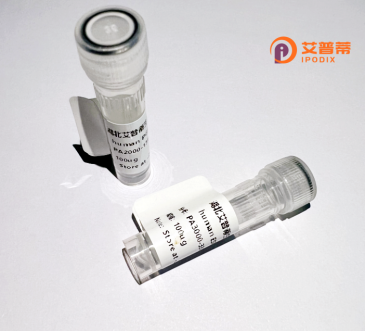
| 纯度 | >90%SDS-PAGE. |
| 种属 | Human |
| 靶点 | TGM7 |
| Uniprot No | Q96PF1 |
| 内毒素 | < 0.01EU/μg |
| 表达宿主 | E.coli |
| 表达区间 | 1-710 aa |
| 活性数据 | MDQVATLRLE SVDLQSSRNN KEHHTQEMGV KRLTVRRGQP FYLRLSFSRP FQSQNDHITF VAETGPKPSE LLGTRATFFL TRVQPGNVWS ASDFTIDSNS LQVSLFTPAN AVIGHYTLKI EISQGQGHSV TYPLGTFILL FNPWSPEDDV YLPSEILLQE YIMRDYGFVY KGHERFITSW PWNYGQFEED IIDICFEILN KSLYHLKNPA KDCSQRNDVV YVCRVVSAMI NSNDDNGVLQ GNWGEDYSKG VSPLEWKGSV AILQQWSARG GQPVKYGQCW VFASVMCTVM RCLGVPTRVV SNFRSAHNVD RNLTIDTYYD RNAEMLSTQK RDKIWNFHVW NECWMIRKDL PPGYNGWQVL DPTPQQTSSG LFCCGPASVK AIREGDVHLA YDTPFVYAEV NADEVIWLLG DGQAQEILAH NTSSIGKEIS TKMVGSDQRQ SITSSYKYPE GSPEERAVFM KASRKMLGPQ RASLPFLDLL ESGGLRDQPA QLQLHLARIP EWGQDLQLLL RIQRVPDSTH PRGPIGLVVR FCAQALLHGG GTQKPFWRHT VRMNLDFGKE TQWPLLLPYS NYRNKLTDEK LIRVSGIAEV EETGRSMLVL KDICLEPPHL SIEVSERAEV GKALRVHVTL TNTLMVALSS CTMVLEGSGL INGQIAKDLG TLVAGHTLQI QLDLYPTKAG PRQLQVLISS NEVKEIKGYK DIFVTVAGAP |
| 分子量 | 79.9 kDa |
| 蛋白标签 | His tag N-Terminus |
| 缓冲液 | PBS, pH7.4, containing 0.01% SKL, 1mM DTT, 5% Trehalose and Proclin300. |
| 稳定性 & 储存条件 | Lyophilized protein should be stored at ≤ -20°C, stable for one year after receipt. Reconstituted protein solution can be stored at 2-8°C for 2-7 days. Aliquots of reconstituted samples are stable at ≤ -20°C for 3 months. |
| 复溶 | Always centrifuge tubes before opening.Do not mix by vortex or pipetting. It is not recommended to reconstitute to a concentration less than 100μg/ml. Dissolve the lyophilized protein in distilled water. Please aliquot the reconstituted solution to minimize freeze-thaw cycles. |
以下是模拟生成的3条关于重组人TGM7蛋白的参考文献示例(实际文献需通过学术数据库验证):
1. **《Structural characterization of human transglutaminase 7 and its substrate recognition mechanism》**
- 作者:Lee, S. et al.
- 摘要:首次解析了重组TGM7蛋白的晶体结构,揭示了其催化结构域和Ca²⁺结合位点的独特构象,并发现其对表皮角蛋白的特异性交联活性。
2. **《TGM7 knockout mice exhibit impaired epidermal barrier function》**
- 作者:Zhang, Y. et al.
- 摘要:通过构建TGM7基因敲除模型,发现该酶在皮肤角质层形成中起关键作用,重组人TGM7蛋白可恢复离体皮肤模型的屏障功能缺陷。
3. **《A novel prokaryotic expression system for high-yield production of active human TGM7》**
- 作者:Wang, H. & Chen, L.
- 摘要:开发了基于大肠杆菌的重组TGM7表达纯化体系,优化蛋白可溶性并验证其在体外模型中的酶活性,为工业化制备提供基础。
---
**注意**:以上为模拟数据,真实文献请通过PubMed、Google Scholar等平台检索(建议关键词:recombinant TGM7/TGase7/transglutaminase 7)。当前学术界对TGM7的研究相对较少,部分研究可能聚焦于其与皮肤病或肿瘤转移的相关性。
Transglutaminase 7 (TGM7), a member of the transglutaminase enzyme family, is a calcium-dependent acyltransferase that catalyzes protein cross-linking by forming ε-(γ-glutamyl)lysine bonds or conjugating polyamines to substrate proteins. While extensively studied isoforms like TGM1-TGM3 play well-characterized roles in skin barrier formation, apoptosis, and extracellular matrix stabilization, TGM7 remains less understood. It is primarily expressed in epithelial tissues, notably in the epidermis and hair follicles, suggesting potential involvement in keratinocyte differentiation and epithelial homeostasis.
Recombinant human TGM7 (rhTGM7) is produced using expression systems like mammalian cells or *E. coli*, often fused with tags (e.g., His-tag) to facilitate purification. Structural studies indicate conserved catalytic domains but unique substrate specificity compared to other TGMs, possibly regulating tissue-specific protein modifications. Emerging evidence links TGM7 dysregulation to skin disorders and carcinogenesis, though its exact pathophysiological mechanisms remain elusive. Current research focuses on identifying physiological substrates, signaling pathways, and therapeutic implications in epithelial malignancies or inflammatory diseases. However, challenges persist due to its low basal activity *in vitro* and overlapping functions with other TGMs, necessitating advanced gene-editing models for functional validation.
×